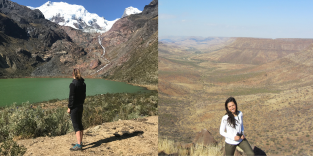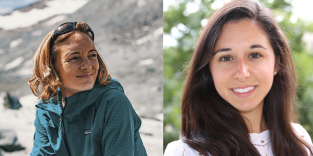A World Water Day Event - Hidden Water: Valuing water we cannot see
Online
Cabot Institute for the Environment is delighted to bring together two leading researchers to discuss the value of ‘hidden water’ resources: groundwater and glaciers. Dr Debra Perrone, University of California, will discuss her research which revealed millions of groundwater wells and strategies to protect them. Professor Jemma Wadham, Cabot Institute for the Environment, will discuss the impacts of glacier retreat in the Peruvian Andes and solutions to adapt to these changes. Chaired by Cabot Institute for the Environment water experts, Dr Katerina Michaelides and Dr Rafael Rosolem. There will be time for questions and discussion.
This online event takes place on United Nations World Water Day. World Water Day, 22 March 2021, is about what water means to people, its true value and how we can protect this vital resource.
About the talks
Short term solutions to groundwater depletion limit sustainability goals
Groundwater is often referred to as an invisible resource, hidden beneath our feet. Groundwater wells—the infrastructure used to access groundwater—are small, distributed, and lost among landscapes. By contrast, our surface water infrastructure is large and visible—reservoirs that support water supply and recreation, dams, and hydroelectric facilities. In this talk, Perrone reveals the results of a five-year research project to record the location and construction details of millions of groundwater wells. The research provides vital insights into the haves and have nots of water and identifies strategies to minimize the impacts of groundwater depletion.
Retreating glaciers and toxic rivers in the Peruvian high Andes
The world’s glaciers contain around two-thirds of the freshwater on the planet, yet they are often hidden to us – perched up high in our mountains and at the Poles. As they retreat, their changing size and melt rates have huge implications for water supply to mountain communities. We often focus on how glacier change will affect the “quantity” of water available to people, but rarely water “ quality” and how healthy it is to drink. This research explores the cascading impacts of glacier retreat in the Peruvian Andes, where rivers are becoming highly acidic and enriched in toxic heavy metals as glaciers retreat over metal-rich rocks. Here, working with local communities and finding solutions that enable us to adapt to these changes is vital to plotting a future path to secure and safe water.
About the speakers
The event will be chaired by Cabot Institute for the Environment Water theme co-leads, Dr Katerina Michaelides and Dr Rafael Rosolem.
Dr Debra Perrone
Debra Perrone is an Assistant Professor of University of California, Santa Barbara’s Environmental Studies Program. Dr. Perrone integrates research methods from engineering, physical science, policy science, and law to inform water sustainability and public policy. Her research is shared through policy briefs, interactive online dashboards, and publications in top scientific journals including Proceedings of the National Academy of Sciences, Nature Sustainability, and Nature. In 2019, Dr. Perrone co-authored an undergraduate textbook, Water Resources: Science and Society, which provides readers with a foundation in water science and policy and highlights the challenges and opportunities surrounding global water resources.
Professor Jemma Wadham
Jemma Wadham is Professor of Glaciology and Director of the Cabot Institute for the Environment at the University of Bristol and also holds an adjunct professorship at UiT The Arctic University of Norway. She has led more than twenty-five expeditions to glaciers around the world, including to Greenland, Antarctica, Svalbard, Chilean Patagonia, the Peruvian Andes and the Himalaya, and has won several prestigious national awards for her research, including a Philip Leverhulme Prize and Royal Society Wolfson Award. She is best known as a pioneer in the field of understanding glacier-hosted life and the impacts of glaciers on our global carbon cycle.
You will be emailed a link to the Zoom webinar two days before the event and on the morning of the event to make sure last-minute ticket holders can access the webinar.
Please note this event may be recorded.
Contact information


Professor Jemma Wadham and Dr Debra Perrone